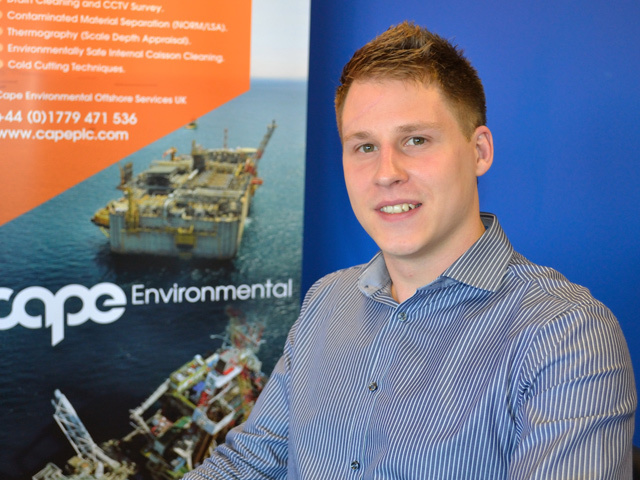
Name: Daniel Watson
Age: 23
Where are you from? Balmedie, Aberdeenshire
Qualifications and where studied? Management Degree with Honours, Robert Gordon University
What is your job? Commercial focal point for Cape Environmental Services
What does it involve? I support our project managers, providing quotes for contracts and ongoing work, forecasting and invoicing, as well as helping to handle the day-to-day dealings of commercial accounts and projects.
Why did you choose your career in the oil and gas industry? It is an exciting and dynamic industry to work in, providing excellent employment opportunities and long term career prospects. With around one million 16-24 year-olds in the UK currently unemployed outwith oil and gas, it demonstrates how difficult it can be for young people to find employment and build a career. The energy industry invests in its talent, offering development opportunities and a route to progression. The global scale of the industry gives me the opportunity to work with different cultures and nationalities with the potential to work overseas, which really appeals to me.
Has it been difficult to learn about the industry? I quickly realised during my placement year that it is a dynamic industry and the business environment is constantly changing with new technologies, investments and the effects of political and economic forces.
I worked across several departments within Cape during my placement, allowing me to clearly see the role each plays in the delivery of our services to our clients. Having access to vastly experienced colleagues, who have a real depth of knowledge, and being supported by them has been invaluable in familiarising myself with the industry.
Any challenges you’ve had to get over? One of the greatest challenges I faced was having to challenge those around me in the workplace. It takes time to build the confidence to challenge those that have been working within Cape and the wider industry for a number of years. I overcame this by focusing on attention to detail, ensuring my viewpoint is concise and constructive with the aim of finding solutions, instead of presenting problems to management with no indication of how to solve them.
What are the best and worst bits of your job? The best bits are that each day is different, due to the fast-paced nature of the business at Cape, as we work to meet client requirements, and ensure we run an efficient operation. The only downside of my job is that work scopes, where you put so much effort in to meet deadlines, can be easily cancelled or postponed due to outside factors, meaning we have to start the planning process again. It’s the nature of the industry, and something I’m very used to now.
What do you think are some of the misconceptions about the industry? As none of my family have careers in the sector I thought it was a dangerous industry, but it’s the complete opposite – health and safety is the top priority of every operator.
Another misconception was that the sector only employs people already in the industry or those with an engineering background and relevant experience. Companies across the sector, including Cape, are willing to give opportunities to those with transferable skills from other industries or people straight out of education.
Where do you see your career going? I’m taking it one step at a time – my focus is on continuing to learn in my role, expanding my knowledge of the commercial drivers within Cape. Having a solid commercial understanding is a key factor in enabling me to be effective in my role and a valuable resource to other departments within the business. I am also keen to learn more about the operations and project function. I would also consider working abroad with Cape, but that would be a few years down the line.
What advice would you give to others looking to get into the oil and gas industry? While studying, build your basic skills such as communication, decision making and problem solving. Skills are transferable and showing willingness to learn is what an employer will find attractive. Work hard at university or college, as the reading and research work will be rewarded later in employment as it will give you a better understanding of the sector and enhance decision making skills. Ensure your CV is well presented, tailored to the organisation and don’t be afraid to ask questions.
An observation I have made is that there is a high volume of people within the industry currently moving from one company to another every 12 to 18 months for various reasons. If an organisation gives an individual an employment opportunity it is beneficial to repay this with a degree of loyalty to the company, carving a successful career path with the business instead of jumping ship.
If you weren’t working in the oil and gas industry, what other job would you be doing? Possibly a career in the catering industry as a chef. I have worked in kitchens before and really enjoyed cooking while seeing the customers happy. Perhaps one day I would even open my own bistro.
Recommended for you
